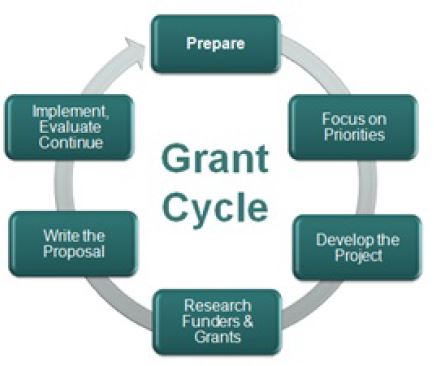Read the Request For Proposal
It sounds so simple, yet this step is perhaps the most important one. Read the whole Request For Proposal (RFP) or Request For Application (RFA).
Some questions you should ask as you read include:
- Does this grant fit with the mission of your organization?
- Is the scope appropriate in terms, time, funding levels and skill set to accomplish your objectives?
- Does your organization have the capacity to cover expenses until you are reimbursed?
- Can your organization complete the grant in the time frame requested?
Grant writing and reporting are time-consuming, and it has been said that it is as easy to manage a $500,000 grant as it is to manage a $5,000 grant. A study in 2013 found scientists who applied for federally funded research spent an average of 171 hours writing per proposal. Most federal agencies have priority areas that they are interested in funding. Do not waste your time on writing grants that are not a good fit for your organization or its goals.
Preparing Your Proposal
Begin with your ideas, objectives and goals. Map out or outline your project and THEN begin writing. Follow directions. Each proposal should adhere to specific fonts, type size, etc. as requested in the RFP. Reviewers look at hundreds, sometimes thousands, of submissions. It is an easy choice to dismiss proposals that do not follow guidelines stated in the RFP.
Project Scoring
Think like an evaluator. Agencies want to fund projects that will:
- have a novel approach to a common problem,
- present a memorable story,
- have measurable, timely impacts,
- utilize funds in such a way that the project will sustain itself after the funds are depleted and the grant period ends,
- be able to be replicated in other areas or situations and
- meet federal agency goals.
It is important to ask for the project scoring criteria ahead of time so you can address the criteria in your proposal. The proposal should be looked at from the evaluator’s perspective. Ask yourself who will benefit and why should the evaluator care? What makes your grant proposal different or better than the many others they will receive? You want to capture the imagination of the reader.
No one wants to be the official that authorizes the $1,000 toilet seat. Government agencies, just like us, want to have successful stories to tell. Activities must result in measurable outcomes that benefit more than one individual. Grant training suggests that you convince the reviewer that you have a clear plan that will actually achieve the goals outlined.

Wordsmithing
Use specific language. For example, state that your program will assist “residents with annual income of less than $20,000” as opposed to “poor people in the area.” All text in the document should be complete, yet concise. Avoid jargon and acronyms. Do not overuse bullet points. Do not use fancy fonts and layouts. Make it easy for the evaluators to read. The document should be clear without a lot of fluff. When evaluators have to work at understanding your project, it decreases the likelihood of your proposal being accepted.
Document Assembly
Check to see that the documents are correctly formatted and that all parts are included and in the correct order. Grants usually include: benchmarks, implementation plan, impacts, outcomes, results, monitoring, evaluation, reporting, and the budget.
Proofing
At least two, preferably three, outside individuals not associated with the grant should review the document to ensure that all aspects of the project are clear and understandable to those not familiar with the circumstances. The document should also be examined for grammar, spelling and typos. This may or may not be done by the same individuals that read it for overall completeness.
Am I Done Yet?
Allow plenty of time to enable resubmission if needed. Often, grantors will ask for clarification or will allow for a rewrite of the proposal if they feel that the project is worthy but need additional information. Sometimes a revision can only be done within the original time frame of submission, so it is a good idea to always submit as early as possible. Once the grant is approved, make sure to follow through with implementation, evaluation and reporting.
Next Time
Once you have completed a successful grant cycle, you may begin to build a reputation as a better risk, which could increase your chances of obtaining more grants.

References
Agricultural Marketing Service. (2016) Grant Programs
To Apply or Not to Apply: A Survey Analysis of Grant Writing Costs and Benefits. (2015). PLoS One. 2015; 10(3): e0118494. Accessed online at: NCBI.
Bishop, C.
2017,
Tips for a Successful Federal Grant Proposal,
University of Nevada Cooperative Extension, Fact Sheet 17-12


